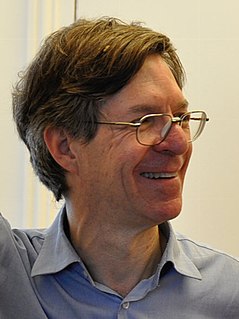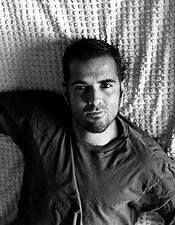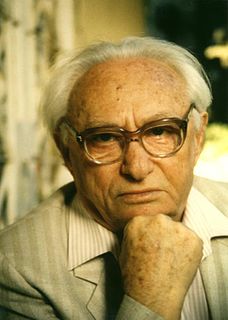Postmodern philosophy is a philosophical movement that arose in the second half of the 20th century as a critical response to assumptions allegedly present in modernist philosophical ideas regarding culture, identity, history, or language that were developed during the 18th-century Enlightenment. Postmodernist thinkers developed concepts like difference, repetition, trace, and hyperreality to subvert "grand narratives", univocity of being, and epistemic certainty. Postmodern philosophy questions the importance of power relationships, personalization, and discourse in the "construction" of truth and world views. Many postmodernists appear to deny that an objective reality exists, and appear to deny that there are objective moral values.

Willard Van Orman Quine was an American philosopher and logician in the analytic tradition, recognized as "one of the most influential philosophers of the twentieth century." From 1930 until his death 70 years later, Quine was continually affiliated with Harvard University in one way or another, first as a student, then as a professor of philosophy and a teacher of logic and set theory, and finally as a professor emeritus who published or revised several books in retirement. He filled the Edgar Pierce Chair of Philosophy at Harvard from 1956 to 1978. A 2009 poll conducted among analytic philosophers named Quine as the fifth most important philosopher of the past two centuries. He won the first Schock Prize in Logic and Philosophy in 1993 for "his systematical and penetrating discussions of how learning of language and communication are based on socially available evidence and of the consequences of this for theories on knowledge and linguistic meaning." In 1996 he was awarded the Kyoto Prize in Arts and Philosophy for his "outstanding contributions to the progress of philosophy in the 20th century by proposing numerous theories based on keen insights in logic, epistemology, philosophy of science and philosophy of language."
In philosophy of science, confirmation holism, also called epistemological holism, is the view that no individual statement can be confirmed or disconfirmed by an empirical test, but only a set of statements .It is attributed to Willard Van Orman Quine who motivated his holism through extending Pierre Duhem's problem of underdetermination in physical theory to all knowledge claims.
The year 1996 in science and technology involved many significant events, listed below.
Technobabble, also called technospeak, is a form of jargon that consists of buzzwords, esoteric language, specialized technical terms, or technical slang that is impossible to understand for the listener. Various fields of practice and industry have their own specialized vocabularies, or jargon, that allow those educated within that industry to concisely convey ideas that may be confusing, misleading, or nonsensical to an outside listener. The difference between technobabble and jargon lies with the intent of the user and the audience: a dishonest person might use overly technical language to overwhelm and confuse the audience, masking their dishonesty, while a fiction writer might use it to cover plot holes or to invoke suspension of disbelief of story elements that defy current understandings of science and technology. Use of jargon within technical circles and with no intent to obfuscate is not usually included in the definition of technobabble.

Fashionable Nonsense: Postmodern Intellectuals' Abuse of Science, published in the UK as Intellectual Impostures, is a book by physicists Alan Sokal and Jean Bricmont. Sokal is best known for the Sokal affair, in which he submitted a deliberately absurd article to Social Text, a critical theory journal, and was able to get it published.

20th-century philosophy saw the development of a number of new philosophical schools—including logical positivism, analytic philosophy, phenomenology, existentialism, and poststructuralism. In terms of the eras of philosophy, it is usually labelled as contemporary philosophy.
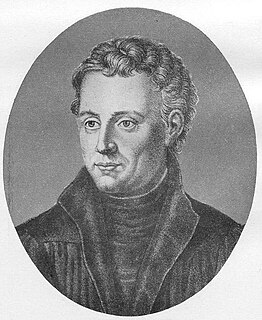
Obscurantism is the practice of deliberately presenting information in an imprecise and recondite manner, often designed to forestall further inquiry and understanding. There are two historical and intellectual denotations of Obscurantism: (1) the deliberate restriction of knowledge—opposition to disseminating knowledge; and, (2) deliberate obscurity—an abstruse style characterized by deliberate vagueness.

Social Text is an academic journal published by Duke University Press. Since its inception by an independent editorial collective in 1979, Social Text has addressed a wide range of social and cultural phenomena, covering questions of gender, sexuality, race, and the environment. Each issue covers subjects in the debates around feminism, Marxism, neoliberalism, postcolonialism, postmodernism, queer theory, and popular culture. The journal has since been run by different collectives over the years, mostly based at New York City universities. It has maintained an avowedly progressive political orientation and scholarship over these years, if also a less and less socialist or Marxist one. Since 1992, it is published by Duke University Press.
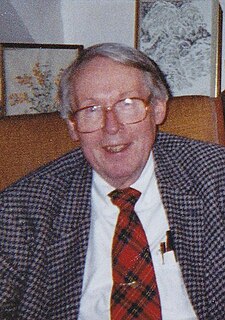
Kaarlo Jaakko Juhani Hintikka was a Finnish philosopher and logician.
The indeterminacy of translation is a thesis propounded by 20th-century American analytic philosopher W. V. Quine. The classic statement of this thesis can be found in his 1960 book Word and Object, which gathered together and refined much of Quine's previous work on subjects other than formal logic and set theory. The indeterminacy of translation is also discussed at length in his Ontological Relativity. Crispin Wright suggests that this "has been among the most widely discussed and controversial theses in modern analytical philosophy". This view is endorsed by Putnam who states that it is "the most fascinating and the most discussed philosophical argument since Kant's Transcendental Deduction of the Categories".
Parody science, sometimes called spoof science, is the act of mocking science in a satirical way. Science can be parodied for a purpose, ranging from social commentary and making political points, to humor for its own sake.
Dagfinn Føllesdal is a Norwegian-American philosopher. He is the Clarence Irving Lewis Professor of Philosophy Emeritus at Stanford University, and professor emeritus at the University of Oslo.
Criticisms of postmodernism, while intellectually diverse, share the opinion that it lacks coherence and is hostile to the notion of absolutes, such as truth. Specifically it is held that postmodernism can be meaningless, promotes obscurantism and uses relativism to the extent that it cripples most judgement calls.
The African-American Baseline Essays are a series of educational materials commissioned in 1987 by the Portland public school district in Portland, Oregon and compiled by Asa Grant Hilliard III, intended to "provide information about the history, culture, and contributions of Africans and African-Americans in the disciplines of Art, Language Arts, Mathematics, Science, Social Studies, and Music," to "be used by teachers and other District staff as a reference and resource just as adopted textbooks and other resources are used" as part of "a huge multicultural curriculum-development effort."
